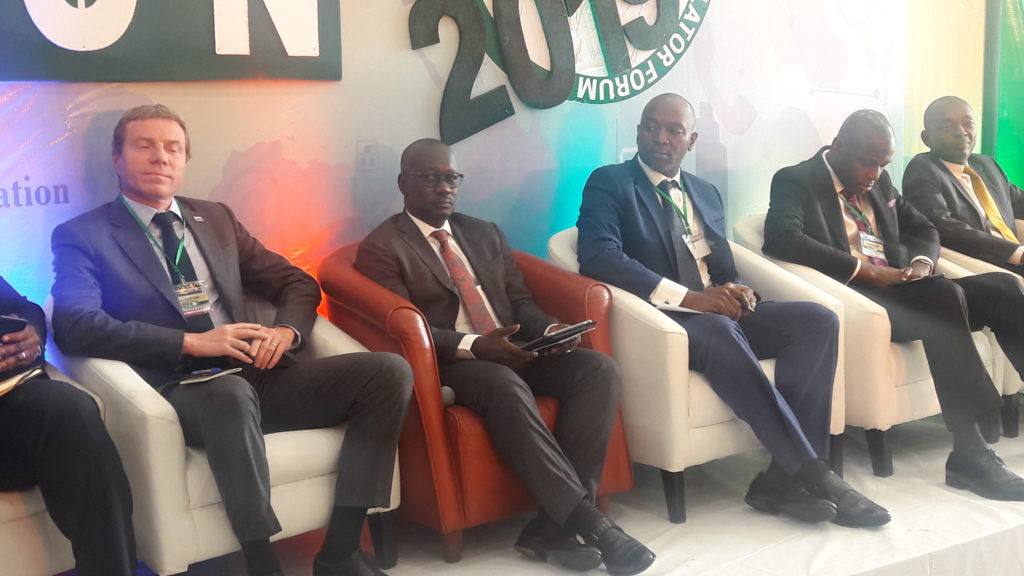By Aaron Ukodie
So they would hear it once again, the Nigerian Communication Commission ( NCC), has told telecos who seem to be clamouring, endlessly, for the regulation of OTT services, that it would be difficult to weave an implementable policy around Over the Top (OTT) services, given their nature of operation and origin.
NCC, the body saddled with the responsibility of charting guidelines and regulations for ICT business in Nigeria, had at several forums complained about difficulties it was encountering in regulating OTT.

On Thursday, while speaking at the Association of Telecommunication Companies of Nigeria ( ATCON) flagship forum, for Telecom Executives and Regulator, the Head of media of the Commission (NCC), Sonny Aragba-Akpore sounded more strident when he said attempt to regulate OTT would be going against global trends.
The NCC officials comment came while industry big brains were sweating it out on how to fashion a guideline around OTT.
OTT refers to services provided over the Internet rather than solely over the provider’s own managed network. The user’s ISP/telco is not involved in the supply of an OTT service. Examples of OTT Services include Chat applications (WhatsApp, WeChat, and Facebook Messenger); streaming video services (Netflix, AmazonPrime, YouTube); Voice Calling and Video chatting services.
OTT players who rely on IP based networks to reach customers, do not make any direct contribution towards the cost of providing it.
While some considered the comment of the NCC representative was in line with global trends, others thought it threw spanners on the discussion, because some of those who spoke at the event were of the view that there should be a way out of the seeming difficult job.
Aragba-Akpore, said his position was rested on the fact that these OTTs operate outside the Nigerian jurisdiction, and are not indigenous to Nigerian, economy and regulatory space.
He said though Nigerian telecos have recorded some loses as a result of the activities of OTTs, they nevertheless have benefitted in many ways. “ Apart from loses recorded as a result of reduced billed voice calls, which are now routed through OTT platforms, such as WhatsApp, Skype calls, etc, the telecom network operators have generated income from data usage.
The NCC media chief was not speaking out of nothing. He was no doubt presenting the views of the Commission, which had given a written position on the matter in an article titled AN OVERVIEW OF PROVISION OF OVER THE TOP [OTT] SERVICES: Policy, Competition & Economic Analysis.

Danbatta, had also, at various forums toed the same line. Recently he told a gathering of some youths in an ICT event that though operators are complaining that services offered by Whatsapp, Facebook, Skype, Viber, among others are putting pressure on the revenue stream of traditional telecom service providers, and there is outrage globally about the activities of these modern day service providers who have been accused of “eating the lunch of the traditional operators” as they (OTT service providers) make money out of the investment and sweat of others, there is nothing the Commission can do for now.
Aragba-Akpore cited the case of India where the government of that country tried to regulate OTTs since 2015 but has not succeeded, so with other countries, saying that the NCC had also tinkered with the idea but had not found a way around it.
The Nigeria ICT ecosystem, he said, should think outside the box, where regulating OTT is concerned. An MTN official, Funso Finish, who represented Ikenna Ikeme agree with Akpore, to the surprise of some at the event, because MTN is one of the telcos, whose revenue is being affected by OTT operations. Medallion Chief, Ike Nnamani also toed the line of Akpore and Funso.
“It is difficult to regulate something that does not occur within your space, but is in the cloud”, the MTN official argues, adding that rather Nigerian operators should think of how to enhance and facilitate innovation and encourage local companies to build solutions that are relevant in OTT.
Nigerian telcos have generated a lot of revenues from OTTs. OTT is good. We have to find the best way it could work for our environment. We could find a way of correcting areas where people are not doing the right thing, but to seek to regulate OTT would be going against global trends, Nnamani pointed out.
Wale Odeyemi of Vodacom is of the view that Nigeria should seek to mitigate issues arising from OTT adoption in the Nigerian environment, encourage local OTT players to upscale and also ask the OTT operators to localize their operation in Nigeria.
Truly, as NCC representative noted, a view supported by some at the event, regulating OTT in other climes have not succeeded. In India the Internet and Mobile Association of India (IAMAI), Broadband India Forum and the Asia Internet Coalition have opposed suggestions by telecom operators that over the top (OTT) services be licensed and regulated. They argue that these constitute an application layer that rides on the bandwidth provided by the telcos.
Though the Telecom Regulatory Authority of India[TRAI] in year 2015 produced a Consultative paper on Regulatory Framework for over-the –top (OTT) services following a consultative forum conducted in year 2014 where representatives of Telecommunications Service Providers [TSPs], OTT providers and legal experts were invited to present their views, as at today the TRAI is yet to take a final position on the matter and they are soliciting for further comments from stakeholders.
Funke Opeke, Managing Director of Mainone, who moderated the discussion on OTT, at the ATCON event, had reeled out the revenue profile of individual OTTS, which are in their hundreds of dollars, and far outstripped the whole yearly budget of Nigeria. She had also noted the operation of the OTTS, which provided borderless services, pose challenges to the entire global ICT ecosystem.












